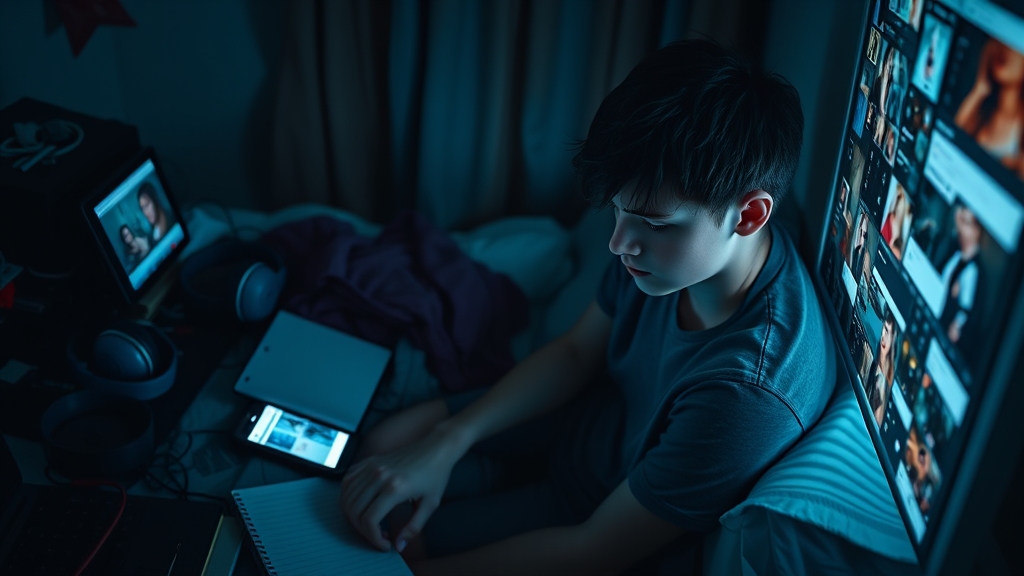In today’s digital age, teens face increasing risks of hypersexuality due to constant exposure to provocative content online and social media influences. This can lead to compulsive behaviors, distorted views of healthy sexuality, and emotional struggles like anxiety or isolation. As online content often blurs curiosity with addiction, it’s essential to set boundaries and seek guidance. Continue exploring to understand how you can protect yourself and build a healthier relationship with digital media.
Key Takeaways
- Increased exposure to online sexual content can lead to compulsive behaviors and distorted perceptions of healthy sexuality in teens.
- Digital addiction may cause hyperfocus on sexual thoughts, impacting teens’ mental health and real-life relationships.
- Without proper guidance, teens risk encountering harmful online interactions, exploitation, and cyberbullying related to hypersexual behaviors.
- Excessive screen time and online sexual content can interfere with sleep, academic performance, and social development.
- Promoting online safety and balanced digital habits is essential to prevent hypersexuality and support healthy adolescent development.

As teenagers navigate the complex journey of adolescence, some may find themselves grappling with hypersexuality, a condition characterized by an excessive preoccupation with sexual thoughts and behaviors. In today’s digital age, this issue is becoming more prominent, largely because of the pervasive influence of the internet and social media. You might find yourself spending hours scrolling through provocative content, often unaware of how easily digital addiction can develop. This constant exposure can distort your understanding of healthy sexuality and lead to compulsive behaviors that feel difficult to control. The line between curiosity and compulsivity blurs as you seek out more explicit material, which can reinforce hypersexual tendencies and make it harder to establish healthy boundaries.
Online safety becomes a critical concern during this time. The internet offers a vast array of content, but not all of it is appropriate or safe for teenagers. Without proper guidance, you might stumble upon explicit material that fuels hypersexual thoughts or even become involved in risky online interactions. These encounters can escalate quickly, exposing you to exploitation, cyberbullying, or manipulation. Protecting yourself means understanding how to navigate digital spaces responsibly. It’s essential to set boundaries, use privacy settings, and be cautious about what you share online. Remember that not everything you see is a true reflection of reality; many images and videos are artificially curated or manipulated to appear more provocative, which can distort your perception of normal sexual behavior.
Protect yourself online by setting boundaries, using privacy settings, and being cautious about what you share.
Building awareness about online safety also involves recognizing the signs of digital addiction. When you start prioritizing online sexual content over real-life relationships or responsibilities, it’s a red flag. Excessive screen time can interfere with your sleep, schoolwork, and social interactions, further fueling feelings of isolation or anxiety. To combat this, establish limits on your internet use and seek out healthier activities that fulfill your emotional needs. Talking to trusted adults about your online experiences can help you develop a clearer perspective and avoid falling deeper into compulsive habits. Remember, seeking help isn’t a sign of weakness but a proactive step toward understanding your behaviors and fostering a healthier relationship with sexuality and technology.
Ultimately, being mindful of how digital addiction influences your thoughts and actions is crucial. You have the power to protect yourself by practicing online safety, setting boundaries, and seeking support when needed. Recognizing the risks associated with hypersexuality in the digital age allows you to take control of your online experiences and develop a healthier, more balanced view of sexuality.
Frequently Asked Questions
How Does Hypersexuality Affect Teens’ Academic Performance?
Hypersexuality can profoundly impact your academic performance by reducing your ability to concentrate. You might find yourself easily distracted during study sessions, making it harder to retain information and complete assignments on time. These study distractions can lead to lower grades and increased stress. Recognizing this pattern is essential, so you can seek help or develop strategies to stay focused and improve your academic success.
What Are the Early Signs of Hypersexual Behavior in Teens?
You notice early signs of hypersexual behavior in teens through their behavioral signs and digital activity cues. They might exhibit increased secrecy about their online presence, spend excessive time viewing or sharing inappropriate content, and show sudden changes in mood or interest. You may also observe risky online interactions or avoidance of conversations about boundaries. Recognizing these signs helps you support them before behaviors escalate, ensuring their well-being and healthy development.
Can Hypersexuality Lead to Long-Term Psychological Issues?
Hypersexuality can lead to long-term psychological issues, affecting your mental health and emotional well-being. If left untreated, it may cause anxiety, depression, and relationship problems. You might struggle with self-esteem or develop addictive behaviors. Recognizing early signs and seeking professional help can prevent these issues from worsening, allowing you to maintain healthier mental health and emotional stability in the long run.
What Role Do Peer Influences Play in Teen Hypersexuality?
Peer influences play a significant role in teen hypersexuality, as peer pressure and social media expose you to heightened sexual content and norms. When your friends or online networks normalize or encourage certain behaviors, you might feel compelled to follow suit, even if you’re uncomfortable. Social media amplifies these influences, making it easier to compare yourself and adopt hypersexualized behaviors to fit in or gain approval.
How Can Parents Effectively Discuss Sexuality With Their Teens?
You should prioritize open communication with your teens, creating a safe space where they feel comfortable sharing their questions and concerns. Be honest, approachable, and non-judgmental. Set clear boundaries about digital content and online interactions, explaining your reasons. Regularly check in with them, listen actively, and provide accurate information. This approach helps them navigate sexuality responsibly while building trust and understanding.
Conclusion
As you navigate the digital world, remember it’s like walking a tightrope—you need balance to stay safe. Just like Sarah, who found herself overwhelmed by endless images and videos, you can avoid falling into the trap of hypersexuality. Studies show a sharp rise in these behaviors among teens today. Stay aware, set boundaries, and don’t let the digital age turn your world into a rollercoaster you can’t control. Your well-being depends on it.









